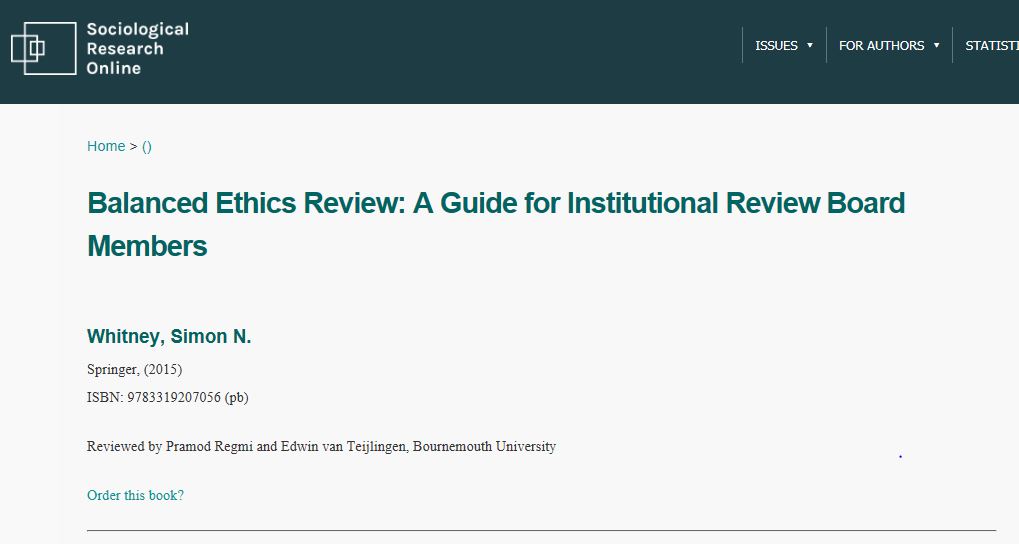 This week saw the publication of the latest issue of the internet-based journal Sociological Research Online. In this issue Dr. Pramod Regmi and Prof. Edwin van Teijlingen published a book review of Balanced Ethics Review: A Guide for Institutional Review Board Members written by the American academic Simon Whitney. [1] In doing so they continue the tradition of FHSS scholars contributing to the research ethics debate. For example, Regmi and colleagues recently had a paper accepted on their insights into research in low-income countries in the journal Developing World Bioethics.[2] Whilst a 2012 FHSS-led paper stressed that researchers conducting research in low-income countries need to apply for research ethics approval to the relevant local authority, if national legislation requires one to do so.[3]
This week saw the publication of the latest issue of the internet-based journal Sociological Research Online. In this issue Dr. Pramod Regmi and Prof. Edwin van Teijlingen published a book review of Balanced Ethics Review: A Guide for Institutional Review Board Members written by the American academic Simon Whitney. [1] In doing so they continue the tradition of FHSS scholars contributing to the research ethics debate. For example, Regmi and colleagues recently had a paper accepted on their insights into research in low-income countries in the journal Developing World Bioethics.[2] Whilst a 2012 FHSS-led paper stressed that researchers conducting research in low-income countries need to apply for research ethics approval to the relevant local authority, if national legislation requires one to do so.[3]
Looking better a little further back, Professor Emerita Immy Holloway wrote about the researcher who may have (potentially) conflicting roles namely those of researcher and health care professional.[4] Whilst a combination of midwifery researchers in the Centre for Midwifery, Maternal & Perinatal Health (CMMPH) highlighted the problems faced by practitioners doing research in their field of practice with perhaps the risk of blurring professional and research ethics, as balancing competing ethical concerns between protecting research participants and over-managing the ethical process can be problematic.[5-6] The latter issue of management and regulation of research ethics has recognised as getting more and more cumbersome and bureaucratic.[7-8]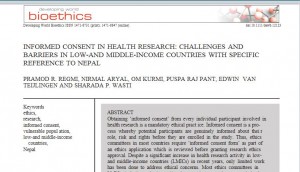
Two further publications by Prof. Ashencaen Crabtree have added to the pool of FHSS publication on research ethics.[9-10] The first one, a book, addressed the problematic issue of gate-keepers in research together with the ethics of critical observation of abuse (potential or actual), as well as the ethics of advocating on behalf of research participants.[9] The second paper covered issues around working with research participants who are regarded as ‘vulnerable’ in a study into the context of care and patient/service user experiences.[10]
Whilst Prof. Parker has highlighted the benefits and dangers of using email and the Internet for social and health research.[11] An even newer research approach is the use of discussion boards as sources of data, which brings its own ethical dilemmas.[12]
In 2010-11 Prof. Parker and colleagues explored in two separate papers the contested meanings and difficulties associated with informed consent, highlighting challenges raised by an almost unquestioned acceptance of biomedical research ethics in social research and questioning whether potential ‘harm’ is different in this context.[13-14]
Prof. Hundley and colleagues discussed the ethical challenges involved in conducting a cluster randomised controlled trial, where getting informed consent can be complication.[15] Whilst it is worth reminding researchers that in issues of informed consent during pregnancy and childbirth one has to consider the potential for harm to two participants.[16]
References
- Regmi, P., van Teijlingen, E. (2017) ‘Balanced Ethics Review: A Guide for Institutional Review Board Members’ by Whitney, Simon N., Springer, (2015) ISBN: 9783319207056 (pb) (book review), Sociological Research Online 22(1) http://www.socresonline.org.uk/22/1/reviews/3.html
- Regmi, PR., Aryal, N., Kurmi, O., Pant, PR., van Teijlingen, E., Wasti, P.P. (forthcoming Informed consent in health research: challenges and barriers in low-and middle-income countries with specific reference to Nepal, Developing World Bioethics.
- van Teijlingen E.R., Simkhada, P.P. (2012) Ethical approval in developing countries is not optional, Journal of Medical Ethics 38:428-430.
- Holloway, I., Wheeler, S. (1995) Ethical Issues in Qualitative Nursing Research, Nursing Ethics 2: 223-232. http://nej.sagepub.com/content/2/3/223.full.pdf+html
- Ryan, K., Brown, B., Wilkins, C., Taylor, A., Arnold, R., Angell, C., van Teijlingen, E. (2011) Which hat am I wearing today? Practicing midwives doing research, Evidence-Based Midwifery 9(1): 4-8.
- van Teijlingen, E.R., Cheyne, H.L. (2004) Ethics in midwifery research, RCM Midwives Journal 7 (5): 208-10.
- van Teijlingen, E. (2006) Reply to Robert Dingwall’s Plenary ‘Confronting the Anti-Democrats: The unethical Nature of Ethical Regulation in Social Science, MSo (Medical Sociology online) 1: 59-60 www.medicalsociologyonline.org/archives/issue1/pdf/reply_rob.pdf
- van Teijlingen, E., Douglas, F., Torrance, N. (2008) Clinical governance and research ethics as barriers to UK low-risk population-based health research? BMC Public Health 8(396) www.biomedcentral.com/content/pdf/1471-2458-8-396.pdf
- Ashencaen Crabtree, S. (2012) Rainforest Asylum: The enduring legacy of colonial psychiatric care in Malaysia, London: Whiting & Birch.
- Ashencaen Crabtree, S. (2013) Research ethics approval processes and the moral enterprise of ethnography. Ethics & Social Welfare. Advance Access: DOI:10.1080/17496535.2012.703683
- Bond, C.S, Ahmed, O.H., Hind, M., Thomas, B., Hewitt-Taylor, J. (2013) The Conceptual and Practical Ethical Dilemmas of Using Health Discussion Board Posts as Research Data, Journal of Medical Internet Research 15(6):e112) Web address: http://www.jmir.org/2013/6/e112/
- Parker, J. (2008) Email, ethics and data collection in social work research: some reflections from a research project, Evidence & Policy: A Journal of Research, Debate & Practice, 4(1): 75-83.
- Hundley, V., Cheyne, H.C., Bland, J.M., Styles, M., Barnett, C.A. (2010) So you want to conduct a cluster randomised controlled trial? Lessons from a national cluster trial of early labour, Journal of Evaluation in Clinical Practice 16: 632-638
- Helmreich, R.J., Hundley, V., Norman, A., Ighedosa, J., Chow, E. (2007) Research in pregnant women: the challenges of informed consent, Nursing for Women’s Health 11(6): 576-585.
- Parker, J., Penhale, B., Stanley, D., (2010). Problem or safeguard? Research ethics review in social care research and the Mental Capacity Act 2005. Social Care & Neurodisability, 1(2): 22-32.
- Parker, J., Penhale, B., Stanley, D. (2011) Research ethics review: social care and social science research and the Mental Capacity Act 2005, Ethics & Social Welfare, 5(4): 380-400.
 On the tenth anniversary of the international Open Access journal PLOS ONE we received an email to inform us that one of our articles was among the top ten per cent of most cited articles in this journal. The email referred to our paper ‘Factors influencing adherence to antiretroviral treatment in Nepal: A mixed-methods study’ [1]. Not bad considering that PLOS ONE has published over 4,300 articles since its inception.
On the tenth anniversary of the international Open Access journal PLOS ONE we received an email to inform us that one of our articles was among the top ten per cent of most cited articles in this journal. The email referred to our paper ‘Factors influencing adherence to antiretroviral treatment in Nepal: A mixed-methods study’ [1]. Not bad considering that PLOS ONE has published over 4,300 articles since its inception.
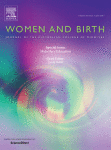
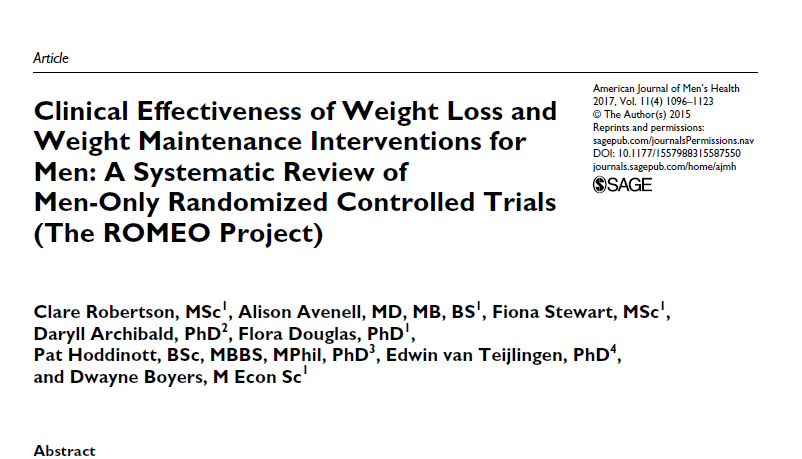
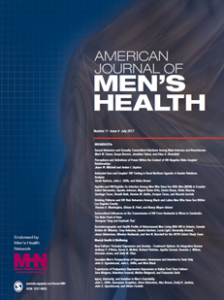
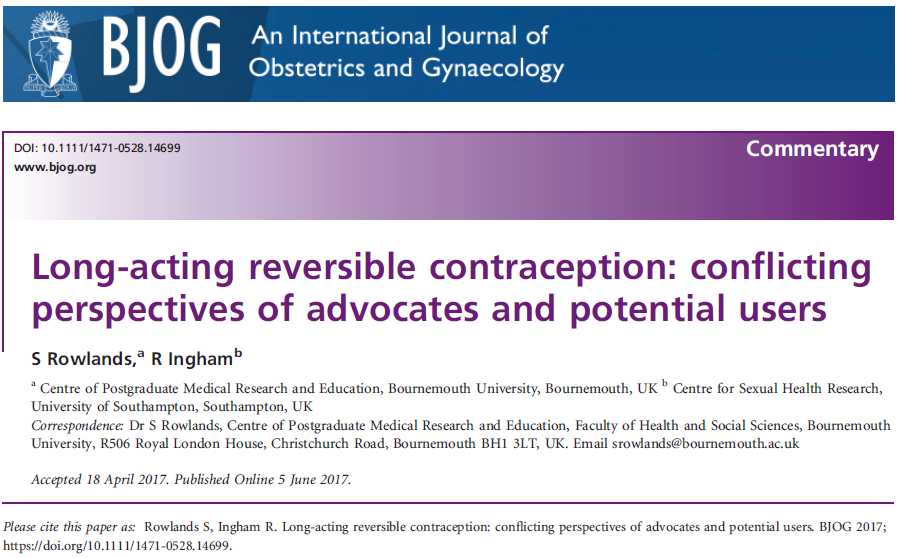
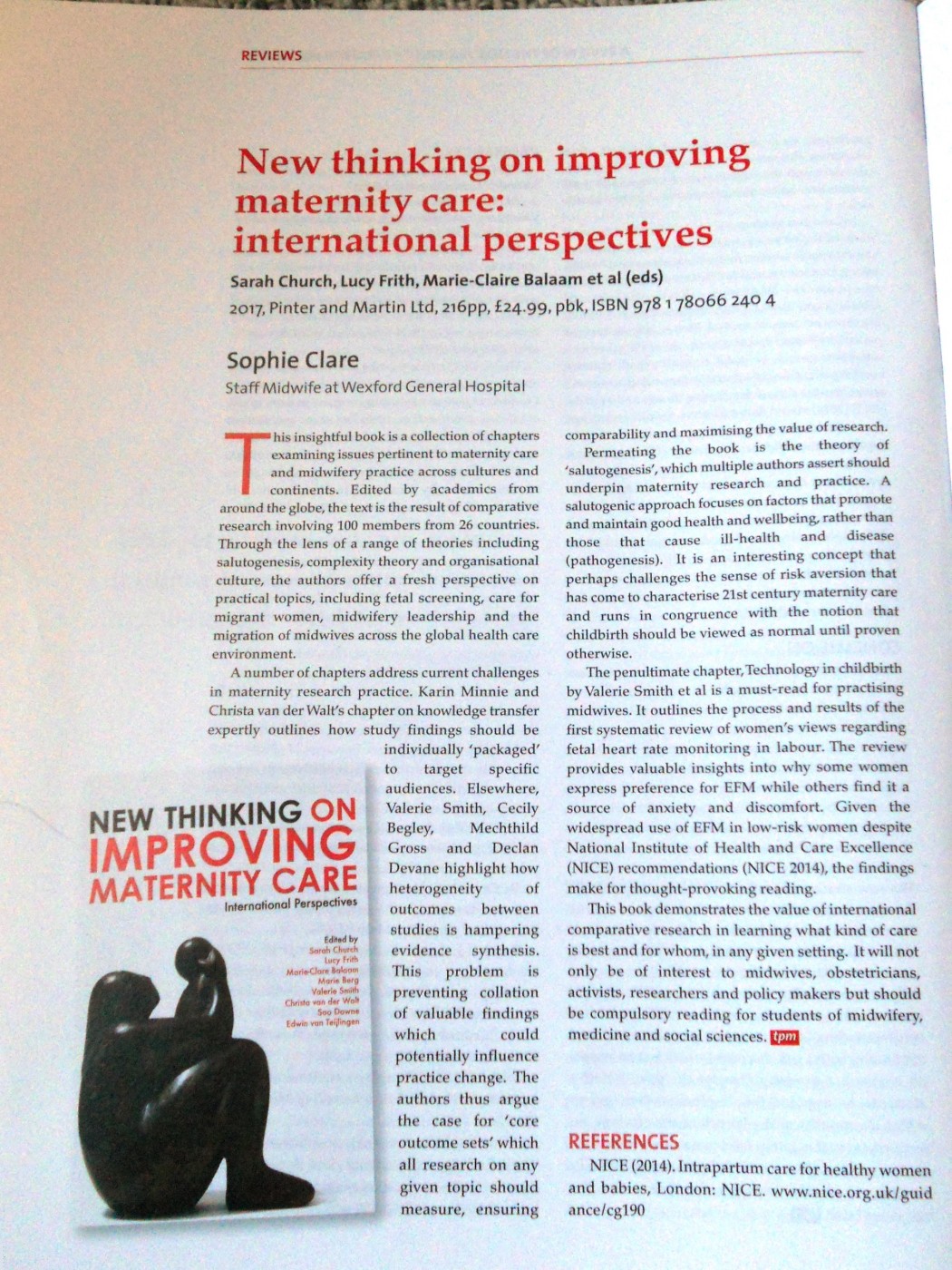
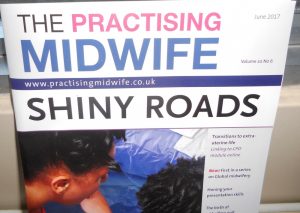
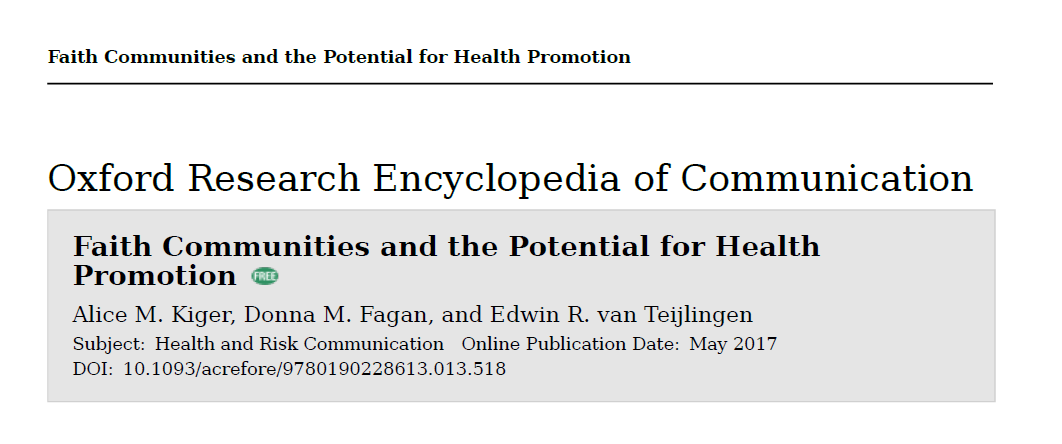
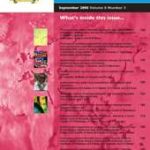
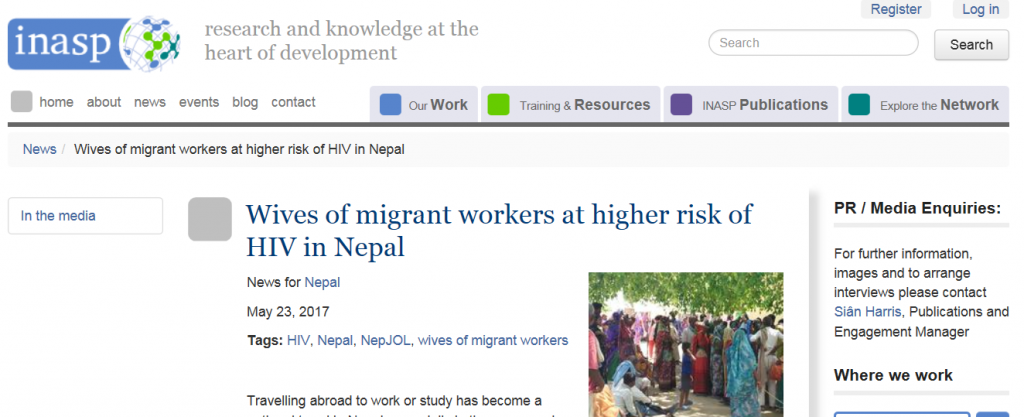
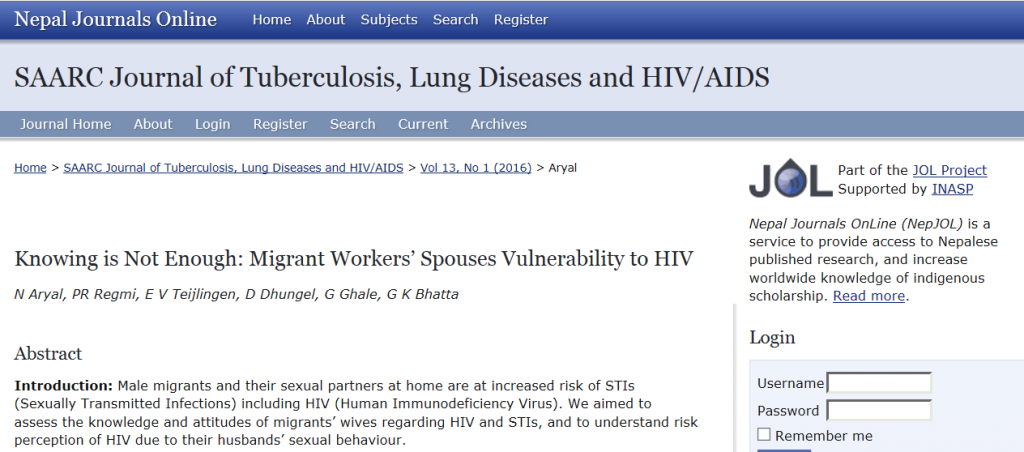
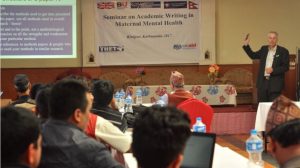
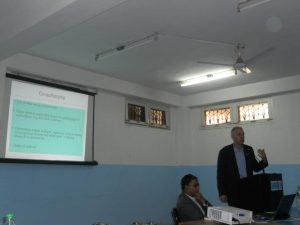
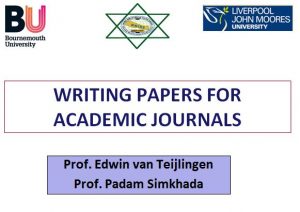



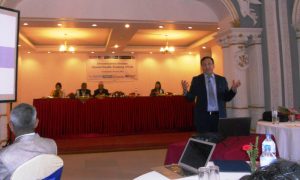
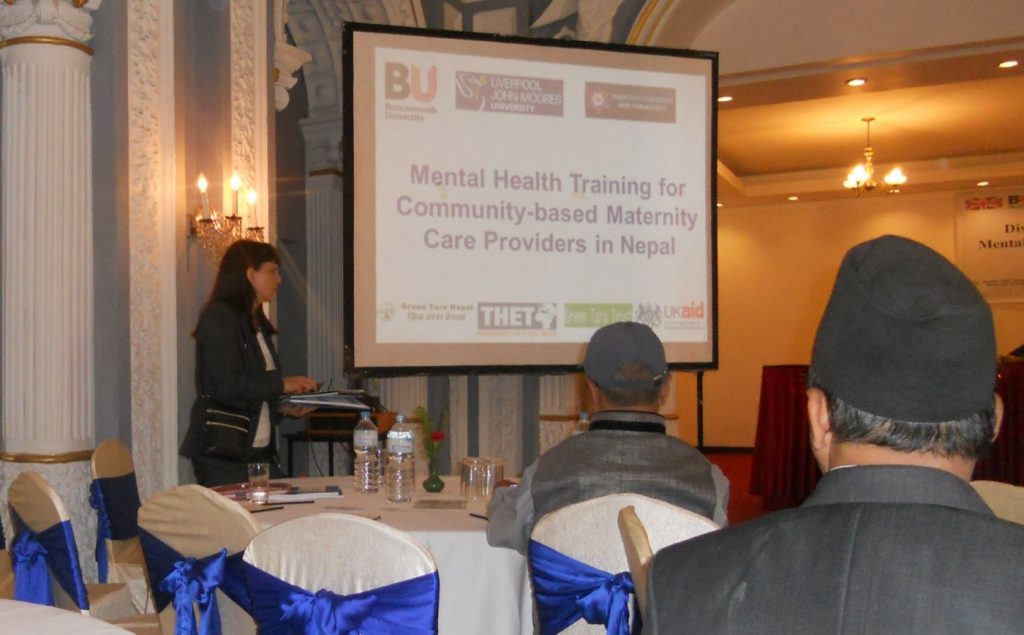
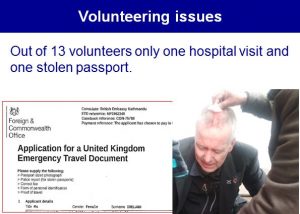
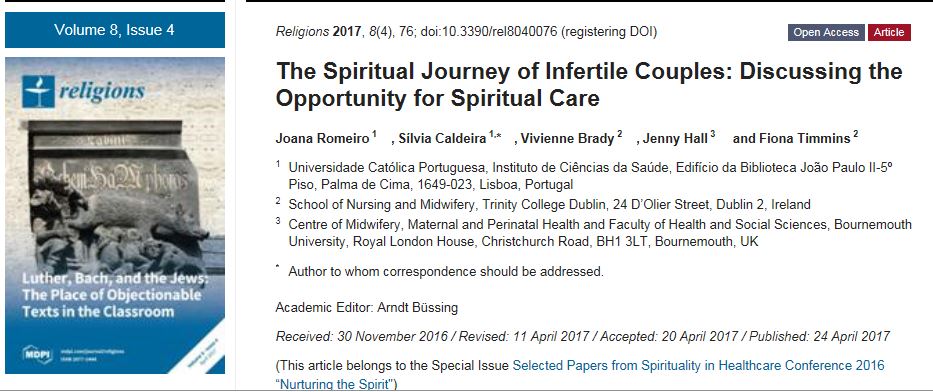
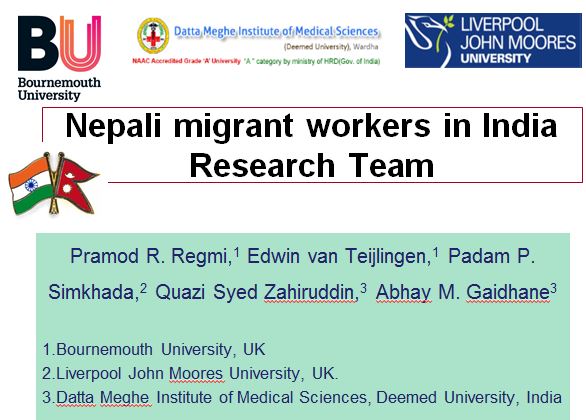




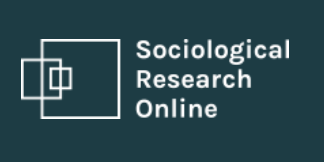
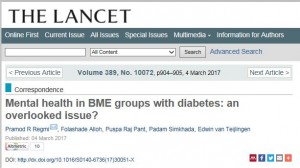


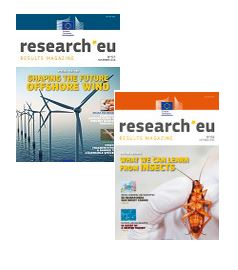 The
The 










 Nursing Research REF Impact in Nepal
Nursing Research REF Impact in Nepal Fourth INRC Symposium: From Clinical Applications to Neuro-Inspired Computation
Fourth INRC Symposium: From Clinical Applications to Neuro-Inspired Computation ESRC Festival of Social Science 2025 – Reflecting back and looking ahead to 2026
ESRC Festival of Social Science 2025 – Reflecting back and looking ahead to 2026 3C Event: Research Culture, Community & Cookies – Tuesday 13 January 10-11am
3C Event: Research Culture, Community & Cookies – Tuesday 13 January 10-11am Dr. Chloe Casey on Sky News
Dr. Chloe Casey on Sky News ECR Funding Open Call: Research Culture & Community Grant – Application Deadline Friday 12 December
ECR Funding Open Call: Research Culture & Community Grant – Application Deadline Friday 12 December MSCA Postdoctoral Fellowships 2025 Call
MSCA Postdoctoral Fellowships 2025 Call ERC Advanced Grant 2025 Webinar
ERC Advanced Grant 2025 Webinar Horizon Europe Work Programme 2025 Published
Horizon Europe Work Programme 2025 Published Update on UKRO services
Update on UKRO services European research project exploring use of ‘virtual twins’ to better manage metabolic associated fatty liver disease
European research project exploring use of ‘virtual twins’ to better manage metabolic associated fatty liver disease